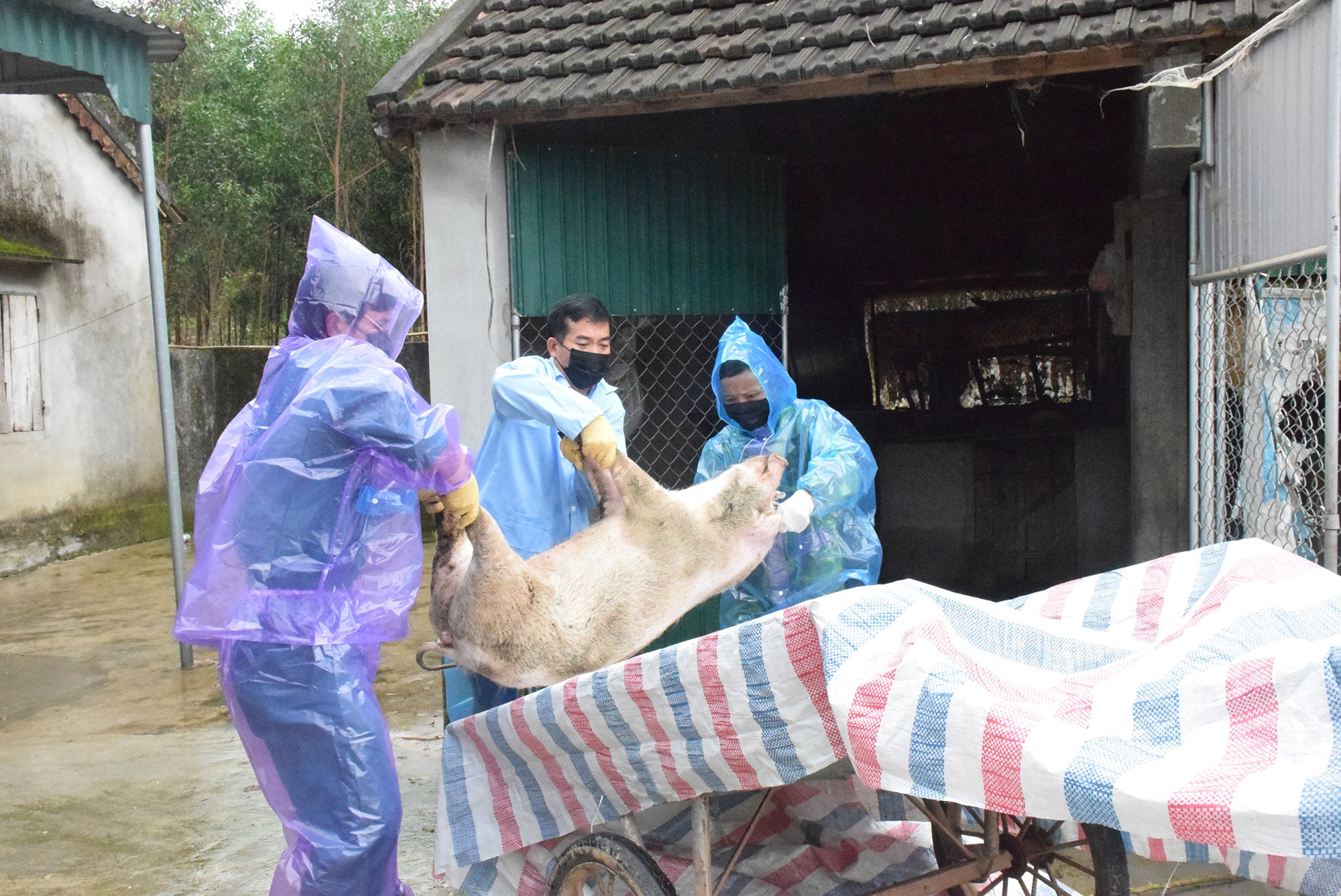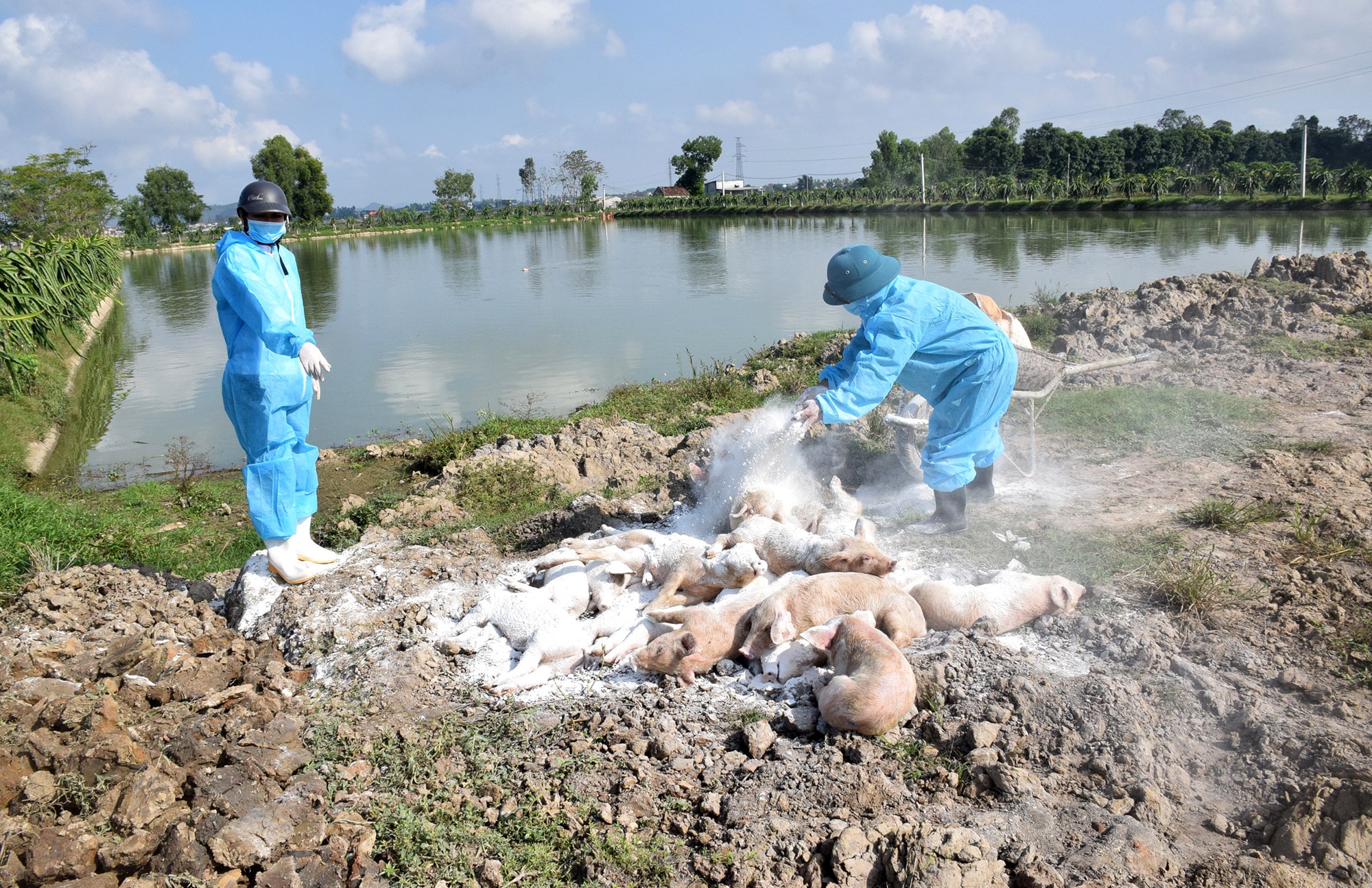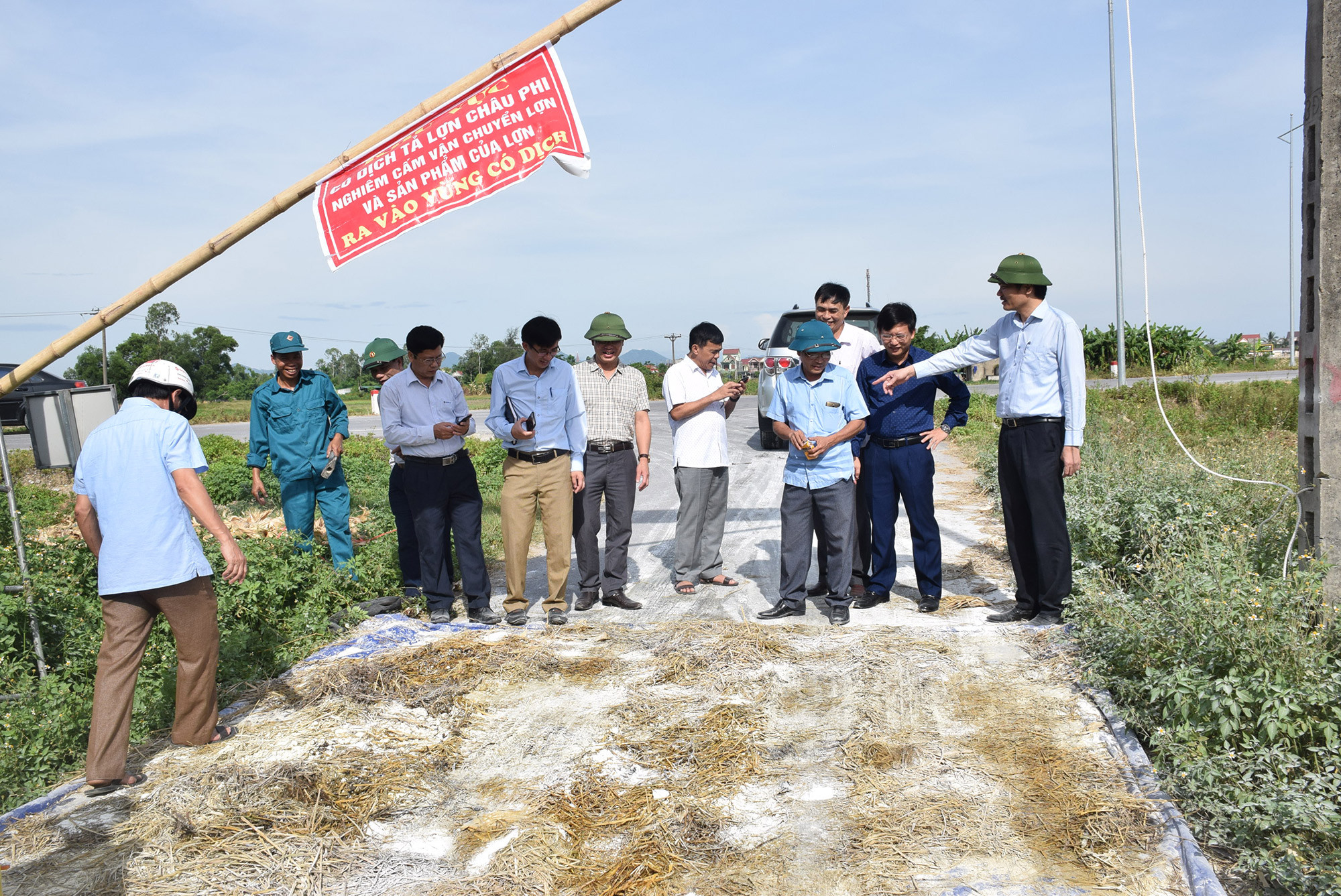African swine fever in Nghe An has 'cooled down'
(Baonghean.vn) - The African swine fever epidemic in Nghe An has been focused on and controlled on a small scale by authorities at all levels and specialized agencies. Statistics from the Department of Animal Husbandry and Veterinary Medicine show that by June, there were only 40 small outbreaks in the province, a significant "cooling down" compared to the time after Tet...
Causes of epidemic recurrence
After a period of calm, by early 2021, the diseaseAfrican swine feverre-emerged in many districts, cities and towns of Nghe An. Thousands of pigs were forced to be destroyed, many households were left penniless, and local authorities had to mobilize the entire political system to fight the epidemic. Among them, the "hottest" epidemic was in the districts of Do Luong, Thanh Chuong, Dien Chau, Yen Thanh...
Typically, in Thanh Chuong district, the epidemic broke out strongly from February to May. 1,746 households in 212 villages and hamlets of 36 communes were infected with African swine fever, the number of pigs killed and destroyed was 6,075, equivalent to 415 tons. In Dien Chau district, at the peak of this epidemic, 23/37 communes tested positive for African swine fever. The epidemic raged in many villages and hamlets, forcing many households to destroy their entire herds of pigs in a moment, including large sows worth 15 - 18 million VND.
 |
| African swine fever has re-emerged strongly in Thanh Chuong district. Photo: Xuan Hoang |
The Department of Animal Husbandry and Veterinary Medicine believes that there are many reasons for the recent resurgence of African swine fever. Many people, when their pigs are infected, do not report to veterinary officers and local authorities to destroy and quarantine them, and even slaughter pigs to sell them in the hope of recouping the costs they have invested in raising them. The widespread practice of spontaneous pig slaughter among the people leads to the potential risk of a resurgence of the disease.
Along with that, the trading of pork in the market is quite complicated and difficult to control. Pork is sold everywhere, inside and outside the market, along the road. Some traders sell pork on the street in villages, hamlets, and hamlets, especially in mountainous areas... The cleaning of barns before and after the epidemic is not done regularly and thoroughly, while the African swine fever virus can exist everywhere from the ground, barn walls, in dust, in water... If barns are not cleaned well, lime is not regularly spread, disinfectants are not sprayed, etc., the disease has the opportunity to recur.
| A series of dead pigs were dumped in a ditch in Yen Thanh rice district in early May 2021. Documentary clip: Xuan Hoang |
Currently, in mountainous areas, there is still a situation of free-range pig farming leading to the spread of diseases in highland districts. The responsibility of some local authorities in implementing measures to prevent and control African swine fever is not really good. In particular, for the past 2 years, there has been no commune-level veterinary staff, so both farmers and local leaders are very confused and cannot determine what kind of disease when livestock is sick in order to have measures to prevent, control and treat it. In many localities, people are hasty in re-herding without ensuring biosafety conditions for diseases, along with that, the origin of pig breeds purchased for raising is unknown, leading to pigs being susceptible to diseases. Another reason is the situationpeople dump dead pigsinto the environment of ponds, lakes, rivers, streams, canals, etc., giving the epidemic virus a chance to spread.
Timely prevention and control
Faced with the complicated situation of African swine fever outbreaks in many localities in the province, the Department of Animal Husbandry and Veterinary Medicine has proactively advised the Provincial People's Committee to deploy solutions to prevent and control the epidemic. That is, promptly supplying disinfectants, disinfectants, epidemic prevention tools... to localities for spraying to prevent the epidemic. In particular, advising the Provincial People's Committee to organize online meetings with districts, cities and towns to direct and deploy urgent measures to prevent and control the epidemic; at the same time, issuing Documents, Directives, Telegrams... to direct localities to strengthen measures to prevent and control the epidemic in a timely manner.
 |
| Destroying infected pigs in Dien Chau district. Photo: Xuan Hoang |
At the same time, promote dissemination and guidance of measures.emergency epidemic prevention and controlsuch as: Strengthening disease surveillance in livestock herds; establishing patrol teams to control the transportation of livestock and poultry to promptly detect, prevent and handle the "selling out" of sick and dead pigs; breeding animals must have clear origins; implementing good sanitation, disinfection and sterilization of livestock barns; enhancing care, feeding and increasing resistance for livestock; strictly complying with the full vaccination of livestock according to regulations; implementing good sanitation, disinfection and sterilization to prevent and control livestock diseases in general; when an outbreak is detected, localities must promptly and strictly apply synchronous and strict epidemic handling solutions according to regulations.
 |
| Provincial leaders and specialized agencies inspect African swine fever prevention and control work in localities. Photo: Xuan Hoang |
Since then, the African swine fever epidemic in the province has "cooled down" significantly. As of June 14, the whole province has only 40 outbreaks that have not passed 21 days, in 12 districts and towns including: Hung Nguyen, Do Luong, Thanh Chuong, Quynh Luu, Yen Thanh, Dien Chau, Anh Son, Nam Dan, Que Phong, Hoang Mai Town, Quy Hop, Tuong Duong. Livestock farmers have been aware of disease prevention work in livestock farming, especially limiting the situation of people dumping dead pigs into the environment.
Although the African swine fever epidemic in the province has "cooled down" significantly, the risk of re-epidemic is high, because there is currently no vaccine to prevent the epidemic; pig farming is still mainly household and small-scale, disease safety solutions have not been applied, and hygiene and disinfection are still limited. In particular, the management of slaughter, transportation and pig farming in many localities is still difficult to manage. Therefore, to control the epidemic in the long term, according to Mr. Dang Van Minh, localities need to continue to synchronously deploy epidemic prevention solutions according to Decision No. 812/QD-UBND dated March 19, 2019 of the Provincial People's Committee on approving the emergency response scenario to African swine fever.
Pig farming is Nghe An's strength, however, small-scale household farming still accounts for the majority. Therefore, to ensure disease safety in livestock farming, people need to implement disease prevention measures well according to the recommendations of veterinary agencies, and local authorities need to strictly implement the issued Veterinary Law.


